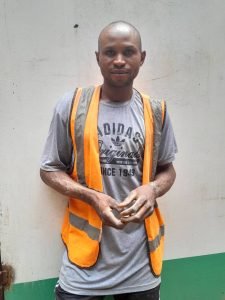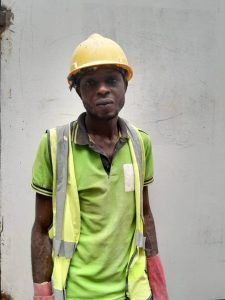Photo: World Bank blog
It’s been more than 3 months since President Bola Tinubu removed subsidy from petrol, but the masses are yet to adjust to the economic hardship that followed the decision. Gom Mirian writes that people are taking drastic steps to save cost, even when it puts their lives at risk.
“I’ve been working as a labourer for three years now, and sleeping under the bridge is the only option I have……”
As the sun sets in Abuja, the capital city of Nigeria, the city’s hardworking on-site labourers pack up their tools and head home. However, for many of them, ‘home’ is a distant dream, as the exorbitant transportation cost leaves them with no choice than to sleep under bridges in the city centre.
Tragically, sleeping under this circumstance has claimed the life of one worker, casting a shadow over the government’s promise of a brighter future for its citizens.
“I’ve been working as a labourer for three years now, and sleeping under the bridge is the only option I have,” laments Aliyu, a 34-year-old construction worker. “The rent is too high in Abuja, and I can’t afford to pay for transportation every day from the N2000 earned daily.”
Aliyu’s predicament is shared by many of his colleagues, who are forced to spend cold, lonely nights beneath the concrete pillars that support the city’s highways.
“We sleep on cardboard boxes or old mattresses we find around here,” says Bello, another labourer, who lives in Mandala, a town in Niger State. “We cover ourselves with blankets, but it’s still freezing at night.”
Sadly, the harsh conditions took a tragic toll on the group in June 2023, as one of their members referred to as Ali succumbed to the extreme cold. “It was devastating,” says Aliyu. “We all knew him, and we were shocked to hear that he had died. He was too young to go like that.”
Despite the Federal Government’s “hope agenda” promise to support its citizens, many workers like Aliyu and Bello feel left behind, with little faith in their leaders.
Moses Taiwo, a 33-year- old father of two, has an accommodation to lay his head after work but complained of the economy not being friendly to him and his family due to his meagre income.
Moses Taiwo, who is also the head of workers at a construction company in Maitama, Abuja (name withheld), bemoaned the difficulties encountered by workers in the sector, saying: “I have been working here for the past ten years, and one of the problems we have is transportation. As a leader, I occasionally help those who are unable to get themselves back home.

“However, the fact is that I only make N2,500 per day, and while we continue to push for an increase, there is a limit to which I can support because I also have to support my family.”
“We hear about all the plans and promises, but we don’t see any change in our situation,” says Abel, a Physics graduate.

“We’re still struggling to survive day by day. I would prefer to work as a Physics Graduate, than as a labourer, which is what I would have done if the government could generate opportunities for graduates.”
Unlike Aliyu and Bello, whose inability to return home forces them to sleep beneath the bridges since their employer would not allow them to spend the night at the site, Joseph is permitted to stay the night on the construction site after work.
“I make N2,700 a day, but getting to the site from Masaka (a suburb in Nasarawa State bordering FCT) costs me practically all of it. I stay here from Monday through Saturday after work so that I may save some money to help my younger children and elderly parents.”

However, a senior supervisor at a construction firm in Maitama, Abuja, who prefers to remain anonymous to avoid repercussions, blamed the poor plight of labourers on a lack of planning and education.
He told Africa Health Report, AHR: “Because labourers’ tasks are not equal, their prices are not fixed everywhere. Some people get as little as N2,500, others as much as N3,500, and artisans make between N5000 and N7000 per day, if they are paid daily.
“The reality is that some graduates earn as little as 60,000 to 70,000 Naira per month and live in the suburbs, but they manage because they believe they will eventually find a better job to support them. However, the majority of these labourers don’t think that way. For example, a worker who earns N3000 per day and works from Monday through Saturday earns an average of N18,000 over four weeks, totaling N72,000.
“He now wants to leave work and sit down at a beer lounge to drink. A well-educated individual would consider putting aside transportation, how to eat, and other considerations, but these people won’t. It all comes down to planning, yet there are still those labourers who receive less and have families and kids who manage better without borrowing than those who make more.
“The market price sets the prices of contractor bills, and the government has no power to alter those costs to appease labourers. But I do think contractors should be more proactive in making sure they get paid on time and regularly satisfy their needs and boost productivity,” he added.
Speaking on the issue, the management of a popular construction company in Nigeria, B. Stabilini & Co. Ltd, stressed that while it is a pity that some labourers can barely afford basic needs such as decent accommodation and transportation, the situation does not apply in the company.
![]()
A staff in the company, who pleaded that his name should not to be mentioned, said: “First, “I will tell you that the incident did not happen here on our site (death of the labourer). But it is disheartening to witness how these hardworking individuals endure such extreme hardships. However, the company has provided buses that convey its workers to and fro after work but some of them will not key into it, saying that they can take care of themselves. Of course, they are adults and we cannot force them.”
There are many more Nigerians who are working round the clock but cannot still earn a living wage to support themselves and their families. The Tinubu administration must deliberately provide interventions that will reduce the economic burden of the citizens, while also creating access to subsidised housing and transportation needs of the populace.
*Photos by Gom Mirian/AHR



